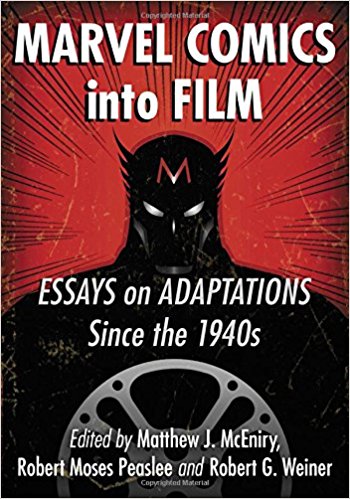My relationship with comic books, superheroes, and seeing this form of entertainment come to life on both television and at the movies is a long one that dates to the Sixties when Adam West and Burt Ward donned their tights every week in living color. The love affair has had its ups and downs as I’ve traveled through life, and though we’ve separated for periods of time, divorce has never entered the conversation.
 And for the last few years, things have never been better. So it was with this positive attitude that I began reading one of the newer editions to McFarland & Company’s stable of scholarly books, Marvel Comics into Film: Essays on Adaptations Since the 1940s, edited by Matthew J. McEniry, Robert Moses Peaslee, and Robert G. Weiner. This is the 13th McFarland book I’ve read, and while they’ve ranged from slightly above average to excellent, this book contains such a mixed bag of essays that I can’t rate it any higher than average.
And for the last few years, things have never been better. So it was with this positive attitude that I began reading one of the newer editions to McFarland & Company’s stable of scholarly books, Marvel Comics into Film: Essays on Adaptations Since the 1940s, edited by Matthew J. McEniry, Robert Moses Peaslee, and Robert G. Weiner. This is the 13th McFarland book I’ve read, and while they’ve ranged from slightly above average to excellent, this book contains such a mixed bag of essays that I can’t rate it any higher than average.
To be honest, I wasn’t exactly sure just what to expect. The Captain America serials from the Forties was a shoe-in, considering the title, and of course I surmised that there would be essays on various movies within the Marvel Cinematic Universe, The X-Men franchise of movies, and the Sony Spider-Man movies. But two essays on the Transformers cartoon movie? And another two on the Elektra movie? I suppose if you want an in-depth look at G.I. Joe: The Movie and the Conan films, you’ll appreciate the essays in Part 2: Licensed Properties.
When I think of seeing my comic book superheroes at the theater or on my TV, “fun” is a key word that pops into my mind. Watching Star-Lord do his distracting dance-off to the Five Stairsteps song “O-o-h Child” in Guardians of the Galaxy is what it’s all about. But when I reached Part 5: The Attempt of Progressivism in the Marvel Universe, things didn’t NOT get easier, like the song promises. Instead, I had to force myself through these four essays that make assumptions and assertions that seem to do nothing but get in the way of enjoying a movie. This is not to say that I’m not sensitive about the way some people are treated, but why does everything have to be so over politicized today? Contained within one of the essays is a statement that a minority hero is relegated to sidekick status in a manner that “coincides with racialized narratives of superheroes that privilege white masculinity. Falcon’s presence serves to reinforce gendered and racialized hierarchies in superhero narratives.” Why does the writer say this? Because in the movie Captain America: The Winter Soldier, Captain America is seen running much faster than the Falcon. Well duh, Captain America became enhanced via the Super Soldier Serum, so of course he’s faster. Race has nothing to do with it. Each hero has his or her own strength, ability, and talents, and making such a comparison based on race seems to be making an argument out of nothing. Granted, there aren’t as many minority heroes, but I think most comic fans don’t sit back and deduce what that writer said. Instead, they think it’s fantastic that the Falcon can fly with his awesome suit, that Tony Stark, with a bad heart, used his intelligence to build his Iron Man armor, and that the Black Widow has amazing hand-to-hand combat skills. I like heroes of all shapes and sizes, regardless of gender or race. It’s insulting that the writer of this particular essay, a doctoral candidate, tries to push an agenda instead of seeing the reality that one character has been augmented through an experimental procedure. Part 5 of the book took my fun away.
There is an interesting essay that focuses on Iron Man, technology, and comparisons to Cyberpunk Culture that is one of the more interesting in the book; a decent look at the three Punisher films and what has gone wrong; and probably my favorite essay explores the complexities of Magneto as a supervillain. If you have a deep yearning to read all things Marvel, you’ll want to add this to your collection. But I come away from this book trying to forget large parts of it, because I’d rather have a dance-off with Ronan the Accuser than to read this one again.
Views: 410
That REALLY sounds like a good book. I’ll keep my eye out next time I hit the Barnes & Nobel. Thanks!
Atom, just keep in mind that these McFarland books don’t come cheap. This one retails for about $35. I do know that Amazon has it if you can’t find it at Barnes and Noble.